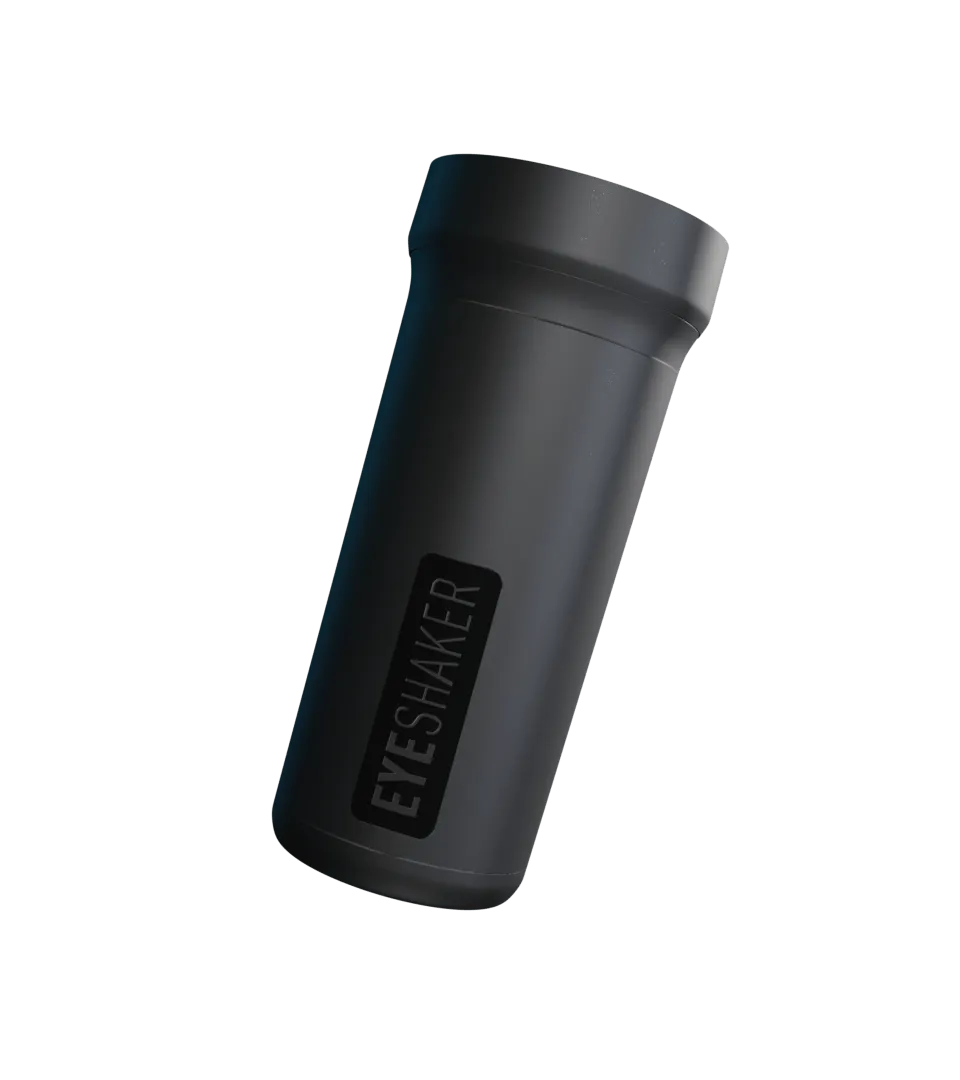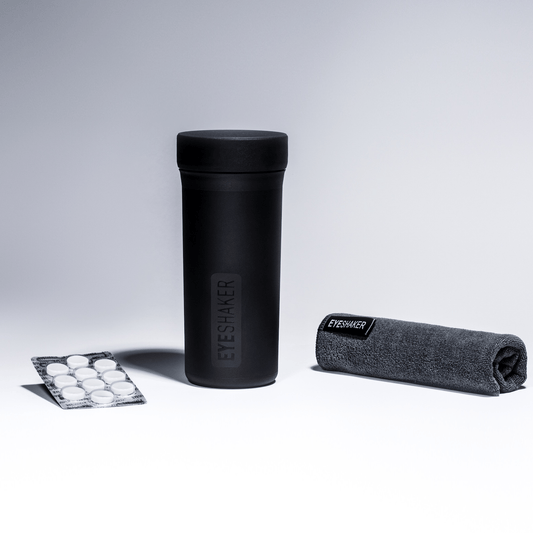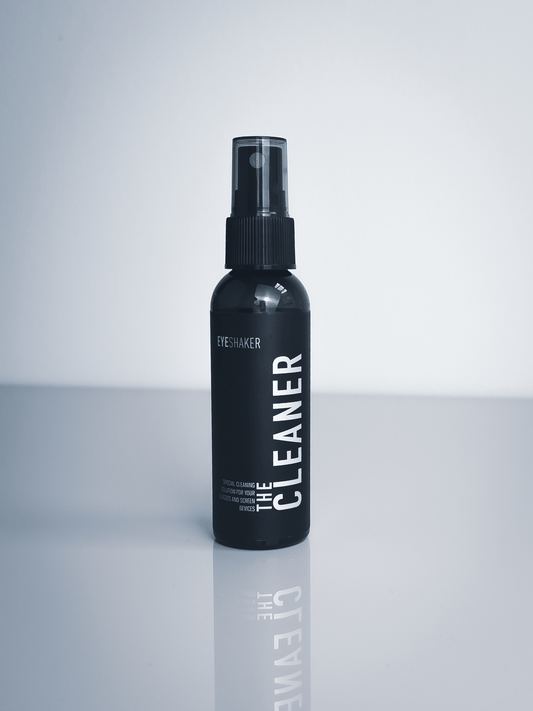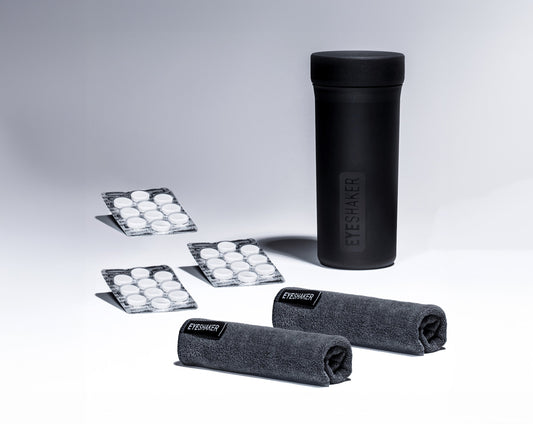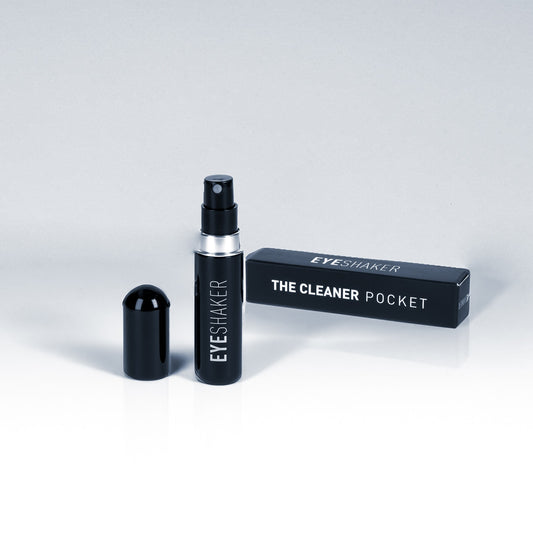Everything
you need to know abouteyewearcleaning!

Schön, dass du den Weg zu unserer FAQ-Seite gefunden hast. Hier findest du Antworten auf alle Fragen rund um das Thema Brillenreinigung. Wir wissen, dass es manchmal verwirrend und mühsam sein kann, die beste Methode zum Reinigen deiner Brille zu finden. Deshalb sind wir hier, um dir zu helfen!
Unsere FAQ-Seite beantwortet Fragen wie: "Wie putze ich meine Brille richtig?" oder "Welche Reinigungsmittel sollte ich verwenden?". Wir geben dir praktische Tipps und Tricks, damit deine Brille immer strahlend sauber ist. Vielleicht fragst du dich, ob es auch möglich ist, deine Brille mit Hausmitteln zu reinigen. Keine Sorge, wir haben auch darauf eine Antwort! Unsere FAQ-Seite informiert dich über verschiedenste Methoden, die du sicher verwenden kannst, um deine Brille auf Hochglanz zu bringen.
Denn eines ist klar, neben den rein funktionellen Gründen, einer längeren Lebensdauer deiner Brille, klarer Sicht und höherem Komfort, fühlt man sich mit einer sauberen Brille einfach großartig! Der Schleier des Alltags verschwindet und ungeahnte Klarheit macht sich breit. Die Frische deiner Brille vermittelt dir automatisch ein Gefühl des Wohlbefindens. Eine saubere Brille verleiht dir ein neues Selbstvertrauen und die Gewissheit, dass du bereit bist für alles, was das Leben dir bietet. Egal ob du auf der Arbeit bist, ein Buch liest oder mit Freunden unterwegs bist, du erlebst die Welt mit klarem und strahlenden Blick. Eine saubere Brille ist wie ein kleines Wellness-Erlebnis für deine Augen - ein Luxus, den du dir jeden Tag gönnen darfst.
Schön, dass du den Weg zu unserer FAQ-Seite gefunden hast. Hier findest du Antworten auf alle Fragen rund um das Thema Brillenreinigung. Wir wissen, dass es manchmal verwirrend und mühsam sein kann, die beste Methode zum Reinigen deiner Brille zu finden. Deshalb sind wir hier, um dir zu helfen!
Unsere FAQ-Seite beantwortet Fragen wie: "Wie putze ich meine Brille richtig?" oder "Welche Reinigungsmittel sollte ich verwenden?". Wir geben dir praktische Tipps und Tricks, damit deine Brille immer strahlend sauber ist. Vielleicht fragst du dich, ob es auch möglich ist, deine Brille mit Hausmitteln zu reinigen. Keine Sorge, wir haben auch darauf eine Antwort! Unsere FAQ-Seite informiert dich über verschiedenste Methoden, die du sicher verwenden kannst, um deine Brille auf Hochglanz zu bringen.
Denn eines ist klar, neben den rein funktionellen Gründen, einer längeren Lebensdauer deiner Brille, klarer Sicht und höherem Komfort, fühlt man sich mit einer sauberen Brille einfach großartig! Der Schleier des Alltags verschwindet und ungeahnte Klarheit macht sich breit. Die Frische deiner Brille vermittelt dir automatisch ein Gefühl des Wohlbefindens. Eine saubere Brille verleiht dir ein neues Selbstvertrauen und die Gewissheit, dass du bereit bist für alles, was das Leben dir bietet. Egal ob du auf der Arbeit bist, ein Buch liest oder mit Freunden unterwegs bist, du erlebst die Welt mit klarem und strahlenden Blick. Eine saubere Brille ist wie ein kleines Wellness-Erlebnis für deine Augen - ein Luxus, den du dir jeden Tag gönnen darfst.
Brillenreinigung
Eyeshaker
Wie putze ich meine Brille richtig?
Um eine Brille richtig zu reinigen benutze bitte nur spezielle Brillenreinigungsgeräte und Brillenputztücher. Eine beliebte Wahl sind auch Ultraschallgeräte für die Brillenreinigung. Hausmittel wie Natron, Rasierschaum, Glasreiniger oder Spülmittel sollten nicht für Brillenreinigung verwendet werden, da sie die Beschichtung der Gläser bzw. des Rahmens beschädigen oder sogar zerkratzen können. Um die Lebensdauer und Qualität der Brille langfristig zu erhalten, ist es wichitg in die richtigen Reinigungsmittel zu investieren.
Brillenreinigung mit Ultraschall

Eyeshaker_set_water

kann man Hausmittel zum Reinigen von Brillen verwenden?
Oft wird warmes Wasser in Kombination mit Spülmittel empfohlen, da es Brillengläser effektiv von Schmutz, Fett und Fingerabdrücke befreien soll.
Handelsübliche Spülmittel enthalten meist starke, alkohol- und/oder säurehaltige Inhaltsstoffe. Dies macht sie für die Reinigung im Haushalt so effektiv, für Brillen jedoch sehr gefährlich. Bei regelmäsiger Verwendung kann es die empfindliche Oberfläche deiner Brille und die Beschichtung deiner Gläser nachhaltig beschädigen. Experten raten daher von Spülmitteln und selbstgemachten Reinigungsmitteln ab, um die Sicherheit und Langlebigkeit deiner Brille nicht zu gefährden.
Auch andere Hausmittel wie Essig, Zahnpasta, Natron, Backpulver, Zitrone, Rasierschaum und sogar Spiritus werden in Foren und Blogs zum Reinigen von Brillen empfohlen. Sie sind definitiv nicht zum Reinigen von Brillengläsern geeignet. Hausmittel können die empfindlichen Gläser, die Beschichtung der Gläser und den Rahmen der Brille beschädigen.
Auch Küchenrolle, Papiertaschentücher oder Geschirrtücher sollten nicht zum Polieren von Brillen verwendet werden, da sie rau sind und Kratzer verursachen können. Verwende bitte nur spezielle Brillenreinigungsmittel und Reinigungsgeräte für Brillen, um die Sicherheit und Langlebigkeit deiner Brille nicht zu gefährden.
Kann ich meine Brillen mit Spülmittel putzen?
Spülmittel enthalten in der Regel starke bis aggressive, alkoholische und/oder säurehaltige Inhaltsstoffe, was sie für den Gebrauch im Haushalt so effektiv, für Brillen allderings gefährlich macht. Sie können die Oberflächen deiner Brille, die Nasenpads und die Beschichtung deiner Gläser nachhaltig schädigen.
Um abzuschätzen, ob Spülmittel mild genug für Brillen und für die Beschichtung von Gläsern geeignet ist, benötigt es chemisches Fachwissen tiefgehende Informationen über die eigenen Brille. Wir raten daher von dieser Variante ab, um die Sicherheit und Langlebigkeit deiner Brille nicht zu gefährden.
Spezialreiniger für Brillen

Kann ich Brillen mit Klarspüler oder Glasreiniger putzen?
NEIN, das solltest du nicht tun. Glasreiniger und Klarspüler sind nicht auf die individuellen Eigenschaften von Brillen und Brillengläsern sowie ihren Beschichtungen abgestimmt. Sie können aggressive, alkoholische und/oder säurehaltige Inhaltsstoffe beinhalten. Diese können die Oberflächen deiner Brille, die Nasenpads und die Beschichtung deiner Gläser angreifen und nachhaltig schädigen.
Kann ich Brillenreiniger selbst machen?
Ja, wenn du die nötigen Kenntnisse hast. Mische Wasser mit Reinigungsmittel und los gehts. Das Reinigungsmittel muss mild und frei von alkoholischen oder säurehaltigen Inhaltsstoffen sein, ansonsten kann es deine Brille, die Nasenpads und die Beschichtung deiner Brillengläser nachhaltig beschädigen.
Das Problem: Handelsübliche Spülmittel enthalten fast immer starke bis aggressive, alkoholische und/oder säurehaltige Inhaltsstoffe, was sie für den Gebrauch im Haushalt so effektiv, für Brillen aber gefährlich macht. Ohne Fachwissen kann man kaum feststellen, ob das Spülmittel säurehaltige oder andere für Brillen schädliche Inhaltsstoffen beinhaltet, daher raten wir davon ab, Brillenreiniger selbst zu machen.
Verlasse dich lieber auf Expertern und Reinigungsmittel, die von deinem:r Optiker:in empfohlen werden. Durch ihre besondere Zusammensetzung sind Brillenreiniger auf die empfindlichen Oberflächen von Brillengläsern und Rahmen abgestimmt und enthalten keine schädlichen Inhaltsstoffe, die Brillen beschädigen können.
Reinigungsmittel für Brillen

Wie kann ich meine Brille unterwegs putzen?
Um deine Brille unterwegs richtig zu reinigen, solltest du ausschließlich Brillen-Reiniger verwenden, die speziell für Brillen entwickelt wurden. Unterwegs bieten sich Cleaning Kits, Putztücher und Sprays an, die leicht und handlich sind.
Vermeide Kleidung, Papiertücher oder Taschentücher. Sie können abrasive Partikel oder Fasern enthalten, die Kratzer oder Schäden auf der Oberfläche der Brillengläser verursachen, zudem entfernen sie Schmutz und Fett nicht effektiv, sondern verschmieren den Schmutz eher auf deinen Brillengläsern.
Wie du einen Brillenspray oder ein Cleaning Kit richtig anwendest, erfährst du im nächsten Punkt.
Wie verwende ich einen Brillenputzspray richtig?
Um deine Brille mit einem Brillenputzspray oder einem Cleaning Kit richtig zu reinigen, folge diesen Schritten:
- Sprühe das Brillenreinigungsspray auf beide Seiten der Brillengläser.
- Verwende ein speziell entwickeltes Brillenreinigungstuch, zum Beispiel THE GLOVE, um das Spray auf den Gläsern zu verteilen und sie zu reinigen. (warum du kein herkömmliches Mikrofasertuch verwenden solltest, erfährst du im nächsten Punkt)
- Reinige die Gläser sanft, indem du kreisförmige Bewegungen von innen nach außen machst.
Achte darauf, auch den Rahmen der Brille regelmäßig und gründlich zu reinigen. Verwende dafür ein spezielles Reinigungsgerät, um Schmutz und Staub von schwer erreichbaren Stellen schonend zu entfernen. Vermeide es, deine Brille mit normalem Haushaltsreiniger oder Spülmittel zu reinigen, da diese Produkte die empfindlichen Gläser beschädigen können.
Wieso ist es wichtig ein spezielles Brillenputztuch zu verwenden?
Ein spezielles Brillenputztuch ist wichtig, um die Brillengläser effektiv und ohne Beschädigung zu reinigen. Brillen-Putztücher sind speziell dafür entwickelt, empfindliche Gläser schonend zu reinigen. Sie bestehen meist aus weichen Mikrofasern, die deine Gläser sanft und gründlich reinigen, ohne die empfindliche Oberfläche zu beschädigen. Sie sind in der Lage, Schmutz, Staub und Fett ohne Rückstände effektiv zu entfernen.
Andere Tücher wie Papiertücher, Taschentücher, Geschirrtücher oder Kleidungsstücke können abrasive Partikel bzw. Fasern enthalten. Diese rauen Bestandteile können Schäden wie z.B. Kratzer auf der Oberfläche deiner Brillengläser verursachen. Zudem entfernen sie Schmutz und Fett nicht rückstandsfrei und verschmieren mehr als zu reinigen.
Hochwertige Brillenputztücher erkennst du an ihrer besonderen Saugfähigkeit. Diese Eigenschaft hebt die Reinigungsleistung auf ein neues Level. Allein saugfähige Mikrofasern ermöglichen streifen- und schlierenfreies Polieren und erzielen so das bestmögliche Ergebnis. (mehr dazu im nächsten Punkt)
Brillenputztuch THE GLOVE

Wie reinige ich meine Brille ohne Schlieren und Streifen?
Verwende ausschließlich, spezielle Reinigungsmittel für Brillen. Entscheidend für das perfekte Ergebnis ist das richtige Brillenputztuch. Hochwertige Putztücher sind anders als herkömmliche Microfasertücher besonders saugfähig, was in Hinsicht auf die Reinigungsleistung einen erheblichen Unterschied macht.
Saugfähige Mikrofasern nehmen die Flüssigkeit des Brillenreinigungssprays gemeinsam mit dem Schmutz auf, anstatt sie nur zu verschmieren und ermöglichen auf diese Weise streifen- und schlierenfreies Polieren.
Lasnik_Eyeshaker-15

Wie reinige ich mein Brillengestell schonend?
Verwende am besten ein spezielles Reinigungsgerät wie den EYESHAKER, um deine Brille ganzheitlich zu reinigen und Schmutz und Staub schonend von schwer erreichbaren Stellen zu entfernen.
The_Cleaning_Kit_water_2

Wie werden Brillen mit Kunststoffgläsern am besten gereinigt?
Die Beschichtung von Brillengläsern ist oft sehr empfindlich, daher ist es wichtig Reinigungsmittel und Putztücher zu verwenden, die eigens für Brillen entwickelt wurden. Achte besonders auf ein weiches und saugfähiges Brillenputztuch, um die Beschichtung deiner Gläser zu schützen.
Vermeide es deine Brille in einem Ultraschallgerät zu reinigen, dies kann die Oberflächen und die Beschichtung deiner Gläser beschädigen und sogar zerstören.
Brillenreinigung mit Ultraschall, was muss ich beachten?
Ultraschallreiniger sollten nicht ohne Fachwissen oder umfangreiche Erfahrung mit geeigneten Materialien verwendet werden, da nicht alle Brillen in einem Ultraschallreiniger gereinigt werden können.
Häufige Verwendung bzw. Anwendung bei nicht geeigneten Materialien kann Brillengläser und Oberflächen beschädigen, insbesondere Kunststoffgläser oder empfindliche Beschichtungen. Bei Brillen mit farbigen Gläsern, Lasergravur und empfindliche Materialien ist besondere Sorgfalt geboten.
Brillenreinigung mit Ultraschall

Meine Brille wird nicht mehr sauber, was kann ich tun?
Um eine Brille richtig zu reinigen, verwende spezielle Reinigungsgeräte, die für Brillen entwickelt wurden.
Achte dabei darauf, dass das Reinigungsmittel deiner Wahl einen ganzheitlichen Reinigungsansatz verfolgt, also nicht nur die Gläser deiner Brille, sondern auch den Rahmen effektiv reinigt. Wir empfehlen dafür den EYESHAKER.
Brillenreinigung mit Hausmitteln wie Natron, Rasierschaum, Glasreiniger oder Spülmittel sollte vermieden werden, da sie die Beschichtung der Gläser bzw. des Rahmens beschädigen oder sogar zerstören können.
Welche Brillen kann ich mit dem EYESHAKER reinigen?
Mit dem Eyeshaker kannst du alle optischen Brillen, Sonnenbrillen, Sportbrillen, Schutzbrillen, die leicht und ohne Druck in die runde Öffnung passen putzen.
Welche Brille soll ich NICHT mit dem EYESHAKER reinigen?
Brillen aus Holz und Papier sollen du NICHT mit dem Eyeshaker reinigen.
Ist die Reinigungsflüssigkeit sicher für meine Brille?
JA – das spezielle Reinigungsmittel verlängert sogar die Lebensdauer deiner geliebten Brillen. Schweiß, Schmutz und andere Umwelteinflüsse haben keine Chance und werden effektiv abgespült.So schonend kannst du deine Brille sonst nicht reinigen.
Kann ich randlose Brillen mit dem EYESHAKER reinigen?
Ja! Wir haben vorgesorgt und dafür The Protector entwickelt. Er schützt Kinder- und auch Randlosbrillen, indem er sie im Shaker fixiert und dafür sorgt, dass sie ohne Probleme und Risiko geschüttelt werden können. Bis zu einer Brillengröße von 143 mm (im geschlossenen Zustand) anwendbar.
Welchen Vorteil bietet der EYESHAKER im Vergleich zu Putztüchern?
Der Eyeshaker putzt im Vergleich zum Putztuch deine ganze Brille d.h. Gläser und Rahmen. Dadurch werden alle Rückstände entfernt, die deine Brille frühzeitig altern lassen. Die Rahmenfarbe, Scharniere, Stegblättchen etc. bleiben länger ansehnlich und funktionstüchtig und die Gläser danken es dir natürlich auf alle Fälle.
Wie oft soll ich meine Brille mit dem EYESHAKER reinigen?
So oft du willst bzw. so oft wie möglich. Eine Überdosis Eyeshaker gibt es nicht. Wir empfehlen deine Brillen täglich, als Teil deiner Morgen- oder Abendroutine zu reinigen.
Kann ich das Brillenreinigungstuch THE GLOVE waschen?
Das Brillenreinigungstuch THE GLOVE kannst du mit 30° Grad – ohne Weichspüler – in der Waschmaschine waschen. Bitte natürlich trocknen lassen und nicht in den Wäschetrockner geben.
Kann das Schütteln meine Brille schädigen?
NEIN! Der elastische Einsatz passt sich deiner Brille optimal an und fixiert sie im Eyeshaker sanft und sicher zugleich. So kannst du bedenkenlos shaken!
Für Kinder- und rahmenlose Brillen verweisen wir auf unseren EYESHAKER Protector, der kleinere Brillen im Shaker fixiert. Diese sind bis zu einer Brillengröße von 143 mm (im geschlossenen Zustand) anwendbar.
Welche Temperatur soll das Wasser im EYEHAKER haben?
Lauwarmes Wasser wäre ideal. Auf keinen Fall sollte heißes oder eiskaltes Wasser verwendet werden.
Wie lange kann ich mit den mitgelieferten cleaning TABS putzen?
Mit einem Cleaning Tab kannst du ca. 10 Tage lang shaken. Eine Packung enthält 10 TABs. Mit einer Packung kannst du also bis zu 100 Tage lang shaken.
FAQ's
Welche Brillen kann ich mit dem EYESHAKER reinigen?
Mit dem Eyeshaker kannst du alle optischen Brillen, Sonnenbrillen, Sportbrillen, Schutzbrillen, die leicht und ohne Druck in die runde Öffnung passen putzen.
Welche Brille soll ich NICHT mit dem EYESHAKER reinigen?
Brillen aus Holz und Papier sollen du NICHT mit dem Eyeshaker reinigen.
Ist die Reinigungsflüssigkeit sicher für meine Brille?
JA – das spezielle Reinigungsmittel verlängert sogar die Lebensdauer deiner geliebten Brillen. Schweiß, Schmutz und andere Umwelteinflüsse haben keine Chance und werden effektiv abgespült.So schonend kannst du deine Brille sonst nicht reinigen.
Kann ich randlose Brillen mit dem EYESHAKER reinigen?
Ja! Wir haben vorgesorgt und dafür The Protector entwickelt. Er schützt Kinder- und auch Randlosbrillen, indem er sie im Shaker fixiert und dafür sorgt, dass sie ohne Probleme und Risiko geschüttelt werden können. Bis zu einer Brillengröße von 143 mm (im geschlossenen Zustand) anwendbar.
Welchen Vorteil bietet der EYESHAKER im Vergleich zu Putztüchern?
Der Eyeshaker putzt im Vergleich zum Putztuch deine ganze Brille d.h. Gläser und Rahmen. Dadurch werden alle Rückstände entfernt, die deine Brille frühzeitig altern lassen. Die Rahmenfarbe, Scharniere, Stegblättchen etc. bleiben länger ansehnlich und funktionstüchtig und die Gläser danken es dir natürlich auf alle Fälle.
Wie oft soll ich meine Brille mit dem EYESHAKER reinigen?
So oft du willst bzw. so oft wie möglich. Eine Überdosis Eyeshaker gibt es nicht. Wir empfehlen deine Brillen täglich, als Teil deiner Morgen- oder Abendroutine zu reinigen.
Kann ich das Brillenreinigungstuch THE GLOVE waschen?
Das Brillenreinigungstuch THE GLOVE kannst du mit 30° Grad – ohne Weichspüler – in der Waschmaschine waschen. Bitte natürlich trocknen lassen und nicht in den Wäschetrockner geben.
Kann das Schütteln meine Brille schädigen?
NEIN! Der elastische Einsatz passt sich deiner Brille optimal an und fixiert sie im Eyeshaker sanft und sicher zugleich. So kannst du bedenkenlos shaken!
Für Kinder- und rahmenlose Brillen verweisen wir auf unseren EYESHAKER Protector, der kleinere Brillen im Shaker fixiert. Diese sind bis zu einer Brillengröße von 143 mm (im geschlossenen Zustand) anwendbar.
Welche Temperatur soll das Wasser im EYEHAKER haben?
Lauwarmes Wasser wäre ideal. Auf keinen Fall sollte heißes oder eiskaltes Wasser verwendet werden.
Wie lange kann ich mit den mitgelieferten cleaning TABS putzen?
Mit einem Cleaning Tab kannst du ca. 10 Tage lang shaken. Eine Packung enthält 10 TABs. Mit einer Packung kannst du also bis zu 100 Tage lang shaken.
Wie reinige ich mein Brillengestell schonend?
Verwende am besten ein spezielles Reinigungsgerät wie den EYESHAKER, um deine Brille ganzheitlich zu reinigen und Schmutz und Staub schonend von schwer erreichbaren Stellen zu entfernen.
Wie werden Brillen mit Kunststoffgläsern am besten gereinigt?
Die Beschichtung von Kunststoffbrillengläsern ist besonders anspruchsvoll. Verwende ausschließlich spezielle Reinigungsgeräte, -mittel und -tücher, die eigens für Brillen entwickelt wurden. Achte besonders auf ein weiches und saugfähiges Reinigungstuch um die Beschichtung deiner Gläser zu schützen. Vermeide es deine Brille in einem Ultraschallgerät zu reinigen, dies kann die Oberflächen und die Beschichtung deiner Gläser beschädigen und sogar zerstören. Wir empfehlen daher schonende und effektive Reinigungsprodukte.
Womit reinige ich beschichteten Brillengläsern am besten?
Die Beschichtung von Brillengläsern ist oft sehr empfindlich, daher ist es wichtig Reinigungsmittel und Putztücher zu verwenden, die eigens für Brillen entwickelt wurden. Achte besonders auf ein weiches und saugfähiges Brillenputztuch, um die Beschichtung deiner Gläser zu schützen.
Vermeide es deine Brille in einem Ultraschallgerät zu reinigen, dies kann die Oberflächen und die Beschichtung deiner Gläser beschädigen und sogar zerstören.
Kann ich meine Brillen mit einem Ultraschallreiniger putz?
Grundsätzlich: JA. Ultraschallreiniger sollten allerdings nicht ohne Fachwissen oder umfangreiche Erfahrung mit geeigneten Materialien verwendet werden, da nicht alle Brillen in einem Ultraschallreiniger gereinigt werden können.
Zu häufige Verwendung bzw. Anwendung bei nicht geeigneten Materialien kann Brillengläser und Oberflächen beschädigen, insbesondere Kunststoffgläser oder empfindliche Beschichtungen. Bei Brillen mit farbigen Gläsern, Lasergravur und empfindliche Materialien ist besondere Sorgfalt geboten.
Meine Brille wird nicht mehr sauber, was kann ich tun?
Um eine Brille richtig zu reinigen, verwende spezielle Reinigungsgeräte, die für Brillen entwickelt wurden.
Achte dabei darauf, dass das Reinigungsmittel deiner Wahl einen ganzheitlichen Reinigungsansatz verfolgt, also nicht nur die Gläser deiner Brille, sondern auch den Rahmen effektiv reinigt. Wir empfehlen dafür den EYESHAKER.
Brillenreinigung mit Hausmitteln wie Natron, Rasierschaum, Glasreiniger oder Spülmittel sollte vermieden werden, da sie die Beschichtung der Gläser bzw. des Rahmens beschädigen oder sogar zerstören können.
Wie putze ich meine Brille richtig?
Um eine Brille richtig zu reinigen, sollten ausschließlich spezielle Reinigungsgeräte, -mittel und -tücher verwendet werden, die eigens für Brillen entwickelt wurden. Eine beliebte Wahl sind Brillenputzsprays und -tücher oder Ultraschallgeräte. Hausmittel wie Natron, Rasierschaum, Glasreiniger oder Spülmittel sollten vermieden werden, da sie die Beschichtung der Gläser bzw. des Rahmens beschädigen oder sogar zerkratzen können. Es empfiehlt sich, in spezielle Brillenreinigungstools oder Reinigungsgeräte zu investieren, um die Lebensdauer und Qualität der Brille auf lange Sicht zu erhalten.
Welche Hausmittel kann ich zum Reinigen von Brillen verwenden?
Es kursieren einige Empfehlungen und Tipps zum Thema Brillen reinigen mit Hausmitteln. Oft wird warmes Wasser in Kombination mit Spülmittel empfohlen, da es Brillengläser effektiv von Schmutz, Fett und Fingerabdrücke befreien soll. Das Wasser sollte warm sein, aber nicht heiß und das Spülmittel soll mild und frei von alkoholischen oder säurehaltigen Inhaltsstoffen sein. Hier entstehen die Probleme, denn herkömmliche Spülmittel enthalten meist starke bis aggressive, alkoholische und/oder säurehaltige Inhaltsstoffe. Dies macht sie für den Gebrauch im Haushalt so effektiv, für jedoch Brillen gefährlich.
Woran erkennt man also, dass ein Spülmittel mild genug für Brillen und die Beschichtung von Gläsern ist und kann man ohne chemisches Fachwissen überhaupt feststellen, ob das Spülmittel säurehaltige oder andere für Brillen schädliche Inhaltsstoffe beinhaltet?
Kurz gesagt: NEIN. Wir raten daher von dieser Variante ab, um die Sicherheit und Langlebigkeit deiner Brille nicht zu gefährden. Spülmittel kann die Oberflächen deiner Brille, Nasenpads und die Beschichtung deiner Gläser nachhaltig beschädigen.
Auch andere Hausmittel wie Essig, Zahnpasta, Natron, Backpulver, Zitrone, Rasierschaum und sogar Spiritus werden in Foren und Blogs zum Reinigen von Brillen empfohlen. Sie sind definitiv nicht zum Reinigen von Brillengläsern geeignet. Diese Hausmittel können die empfindlichen Gläser, die Beschichtung der Gläser und den Rahmen der Brille beschädigen. Auch Küchenrolle, Papiertaschentücher oder Geschirrtücher sollten nicht zum Polieren von Brillen verwendet werden, da sie rau sind und Kratzer verursachen können. Verwende bitte nur spezielle Brillenreinigungsmittel und Reinigungsgeräte für Brillen, um die Sicherheit und Langlebigkeit deiner Brille nicht zu gefährden.
Kann ich meine Brillen mit Spülmittel putzen?
Spülmittel enthalten in der Regel starke bis aggressive, alkoholische und/oder säurehaltige Inhaltsstoffe, was sie für den Gebrauch im Haushalt so effektiv, für Brillen allderings gefährlich macht. Sie können die Oberflächen deiner Brille, die Nasenpads und die Beschichtung deiner Gläser nachhaltig schädigen.
Um abzuschätzen, ob Spülmittel mild genug für Brillen und für die Beschichtung von Gläsern geeignet ist, benötigt es chemisches Fachwissen tiefgehende Informationen über die eigenen Brille. Wir raten daher von dieser Variante ab, um die Sicherheit und Langlebigkeit deiner Brille nicht zu gefährden.
Kann ich Brillen mit Klarspüler oder Glasreiniger putzen?
NEIN. Glasreiniger und Klarspüler sind nicht auf die individuellen Eigenschaften von Brillen und Brillengläsern sowie ihren Beschichtungen abgestimmt. Sie können aggressive, alkoholische und/oder säurehaltige Inhaltsstoffe beinhalten. Diese können die Oberflächen deiner Brille, die Nasenpads und die Beschichtung deiner Gläser angreifen und nachhaltig schädigen.
Kann ich Brillenreiniger selbst machen?
Google sagt: Ja. Einfach Wasser mit Spülmittel mischen und los gehts. Das Spülmittel sollte mild und frei von alkoholischen oder säurehaltigen Inhaltsstoffen sein, ansonsten kann es deine Brille, die Nasenpads und die Beschichtung deiner Brillengläser nachhaltig beschädigen.
Das Problem: Herkömmliche Spülmittel enthalten fast immer starke bis aggressive, alkoholische und/oder säurehaltige Inhaltsstoffe, was sie für den Gebrauch im Haushalt so effektiv, für Brillen aber gefährlich.
Kann man ohne chemisches Fachwissen überhaupt feststellen, ob das Spülmittel säurehaltige oder andere für Brillen schädliche Inhaltsstoffen beinhaltet?
Eher nicht. Wir raten daher davon ab, Brillenreiniger selbst zu machen, um die Sicherheit und Langlebigkeit deiner Brille nicht zu gefährden. Verwende stattdessen Reinigungsmittel, die von deinem:r Optiker:in empfohlen werden. Durch ihre besondere Zusammensetzung sind Brillenreiniger auf die empfindlichen Oberflächen von Brillengläsern und Rahmen abgestimmt und enthalten keine schädlichen Inhaltsstoffe, die Brillen beschädigen können.
Wie kann ich meine Brille unterwegs putzen?
Um deine Brille unterwegs richtig zu reinigen, solltest du ausschließlich Brillen-Reiniger verwendet, die speziell für Brillen entwickelt wurden. Unterwegs bieten sich Cleaning Kits, Putztücher und Sprays an, die leicht und handlich sind.
Vermeide Kleidung, Papiertücher oder Taschentücher. Sie können abrasive Partikel oder Fasern enthalten, die Kratzer oder Schäden auf der Oberfläche der Brillengläser verursachen, zudem entfernen sie Schmutz und Fett nicht effektiv, sondern verschmieren den Schmutz eher auf deinen Brillengläsern.
Wie du einen Brillenspray oder ein Cleaning Kit richtig anwendest, erfährst du im nächsten Punkt.
Wie verwende ich einen Brillenputzspray richtig?
Um deine Brille mit einem Brillenputzspray oder einem Cleaning Kit richtig zu reinigen, folge diesen Schritten:
- Sprühe das Brillenreinigungsspray auf beide Seiten der Brillengläser.
- Verwende ein speziell entwickeltes Brillenreinigungstuch, zum Beispiel THE GLOVE, um das Spray auf den Gläsern zu verteilen und sie zu reinigen. (warum du kein herkömmliches Mikrofasertuch verwenden solltest, erfährst du im nächsten Punkt)
- Reinige die Gläser sanft, indem du kreisförmige Bewegungen von innen nach außen machst.
Achte darauf, auch den Rahmen der Brille regelmäßig und gründlich zu reinigen. Verwende dafür ein spezielles Reinigungsgerät, um Schmutz und Staub von schwer erreichbaren Stellen schonend zu entfernen. Vermeide es, deine Brille mit normalem Haushaltsreiniger oder Spülmittel zu reinigen, da diese Produkte die empfindlichen Gläser beschädigen können.
Wieso ist es wichtig ein spezielles Brillenputztuch zu verwenden?
Ein spezielles Brillenputztuch ist wichtig, um die Brillengläser effektiv und ohne Beschädigung zu reinigen. Brillen-Putztücher sind speziell dafür entwickelt, empfindliche Gläser schonend zu reinigen. Sie bestehen meist aus weichen Mikrofasern, die deine Gläser sanft und gründlich reinigen, ohne die empfindliche Oberfläche zu beschädigen. Sie sind in der Lage, Schmutz, Staub und Fett ohne Rückstände effektiv zu entfernen.
Andere Tücher wie Papiertücher, Taschentücher, Geschirrtücher oder Kleidungsstücke können abrasive Partikel bzw. Fasern enthalten. Diese rauen Bestandteile können Schäden wie z.B. Kratzer auf der Oberfläche deiner Brillengläser verursachen. Zudem entfernen sie Schmutz und Fett nicht rückstandsfrei und verschmieren mehr als zu reinigen.
Hochwertige Brillenputztücher erkennst du an ihrer besonderen Saugfähigkeit. Diese Eigenschaft hebt die Reinigungsleistung auf ein neues Level. Allein saugfähige Mikrofasern ermöglichen streifen- und schlierenfreies Polieren und erzielen so das bestmögliche Ergebnis. (mehr dazu im nächsten Punkt)
Wie reinige ich meine Brille ohne Schlieren und Streifen?
Verwende ausschließlich, spezielle Reinigungsmittel für Brillen. Entscheidend für das perfekte Ergebnis ist das richtige Brillenputztuch. Hochwertige Putztücher sind anders als herkömmliche Microfasertücher besonders saugfähig, was in Hinsicht auf die Reinigungsleistung einen erheblichen Unterschied macht. Saugfähige Mikrofasern nehmen die Flüssigkeit des Brillenreinigungssprays gemeinsam mit dem Schmutz auf, anstatt sie nur zu verschmieren und ermöglichen auf diese Weise streifen- und schlierenfreies Polieren.
Als Optiker Meister Betrieb verfügen wir über langjährige Erfahrung und vor allem Fachkenntnisse im Umgang mit Brillen aller Art sowie Kunden und ihren täglichen Wünschen und Sorgen. Unsere Leidenschaft für Brillen treibt uns an. Wir stehen hinter unseren Empfehlungen und bieten dir qualitativ hochwertige Produkte und Ratschläge. Du kannst dich darauf verlassen, dass wir immer für dich da sind, um dir bei deinen Fragen und Anliegen zu helfen.
Falls du weitere Fragen hast oder individuelle Beratung benötigst, zögere nicht, uns zu kontaktieren. Wir sind hier, um dir zu helfen und sicherzustellen, dass deine Brille immer in bestem Zustand ist.
Als Optiker Meister Betrieb verfügen wir über langjährige Erfahrung und vor allem Fachkenntnisse im Umgang mit Brillen aller Art sowie Kunden und ihren täglichen Wünschen und Sorgen. Unsere Leidenschaft für Brillen treibt uns an. Wir stehen hinter unseren Empfehlungen und bieten dir qualitativ hochwertige Produkte und Ratschläge. Du kannst dich darauf verlassen, dass wir immer für dich da sind, um dir bei deinen Fragen und Anliegen zu helfen.
Falls du weitere Fragen hast oder individuelle Beratung benötigst, zögere nicht, uns zu kontaktieren. Wir sind hier, um dir zu helfen und sicherzustellen, dass deine Brille immer in bestem Zustand ist.

